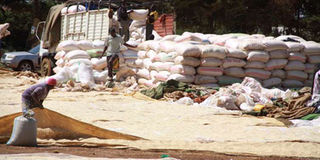Nema blamed for delays in commercialising genetically modified maize

Maize in Eldoret on November 28, 2016. PHOTO | JARED NYATAYA | NATION MEDIA GROUP
What you need to know:
The Kenya Plant Health Inspectorate Service needs the licence to undertake national trials for stem borer-resistant gene modified maize developed by Water Efficient Maize Africa.
In Kenya, stem borer reduces maize output by about 400,000 tonnes, equivalent to annual imports to meet deficits. The loss can increase to 100 per cent during drought or when measures are not taken to control the pest.
The farmers dismissed food safety and environmental concerns, saying countries like Brazil, the US and South Africa have been producing biotech maize for close to 20 years.
Farmers and youths in Busia have blamed the National Environmental Management Authority for delays in commercialising genetically modified maize.
Speaking at a meeting organised by the Youth Organization for Innovation and Entrepreneurship, they urged Nema to release the licence for an environmental and social impact assessment report it approved in June.
The Kenya Plant Health Inspectorate Service needs the licence to undertake national trials for stem borer-resistant gene modified maize developed by Water Efficient Maize Africa.
“We were excited when the National Biosafety Authority approved the release of genetically modified maize and Nema approved the environmental and social impact assessment report. But now we are concerned that Nema is frustrating the commercialisation of the maize by refusing to release the licence,” said the youth’s chief executive Wycliffe Amakobe.
He said this was frustrating making the maize available to smallholder farmers, who are affected by stem borers and cannot afford expensive pesticides.
In Kenya, stem borer reduces maize output by about 400,000 tonnes, equivalent to annual imports to meet deficits. The loss can increase to 100 per cent during drought or when measures are not taken to control the pest.
The farmers dismissed food safety and environmental concerns, saying countries like Brazil, the US and South Africa have been producing biotech maize for close to 20 years.




